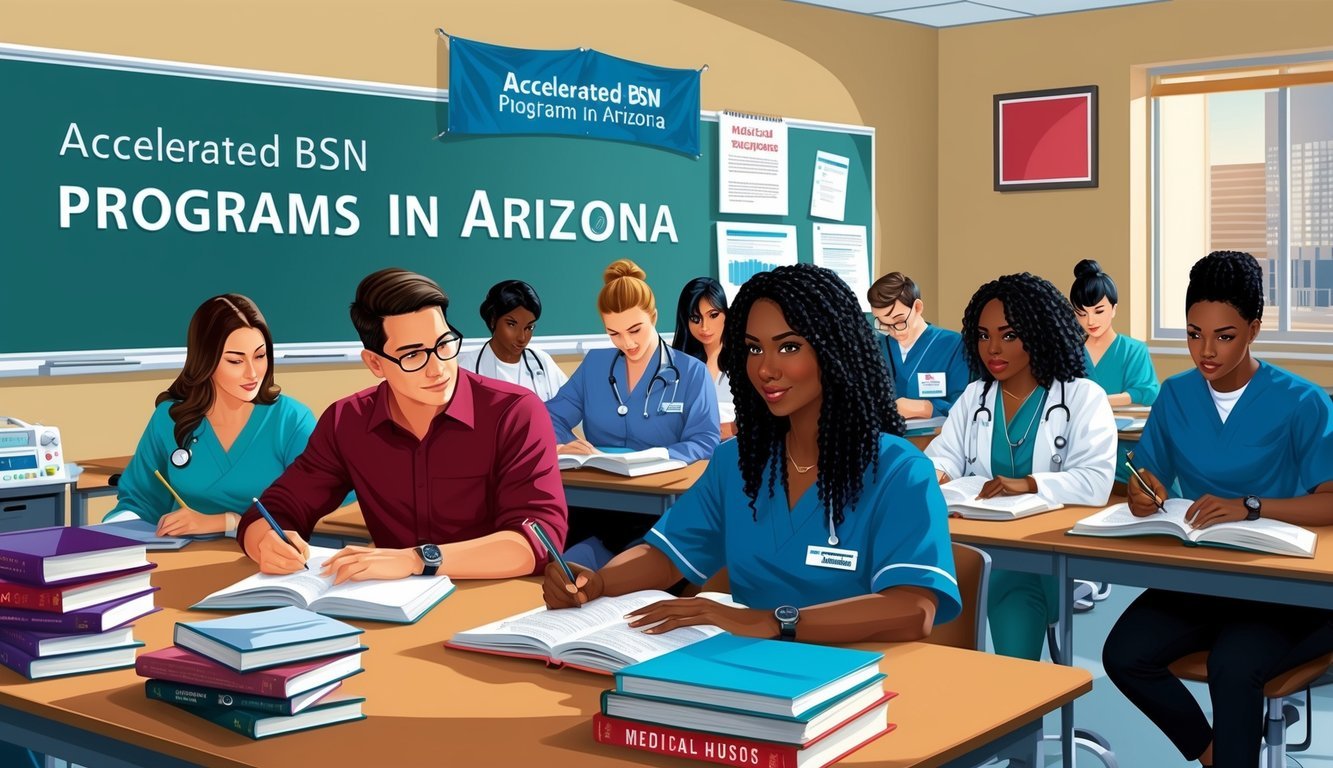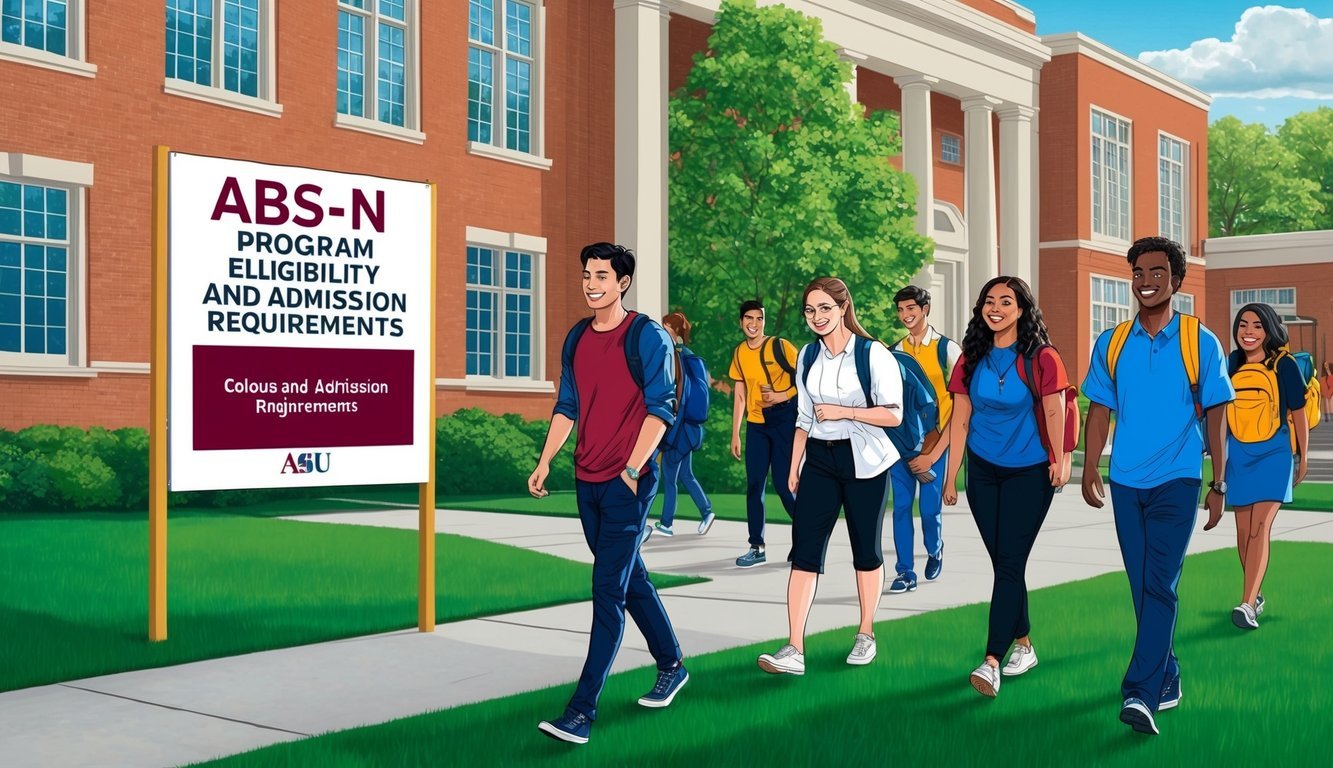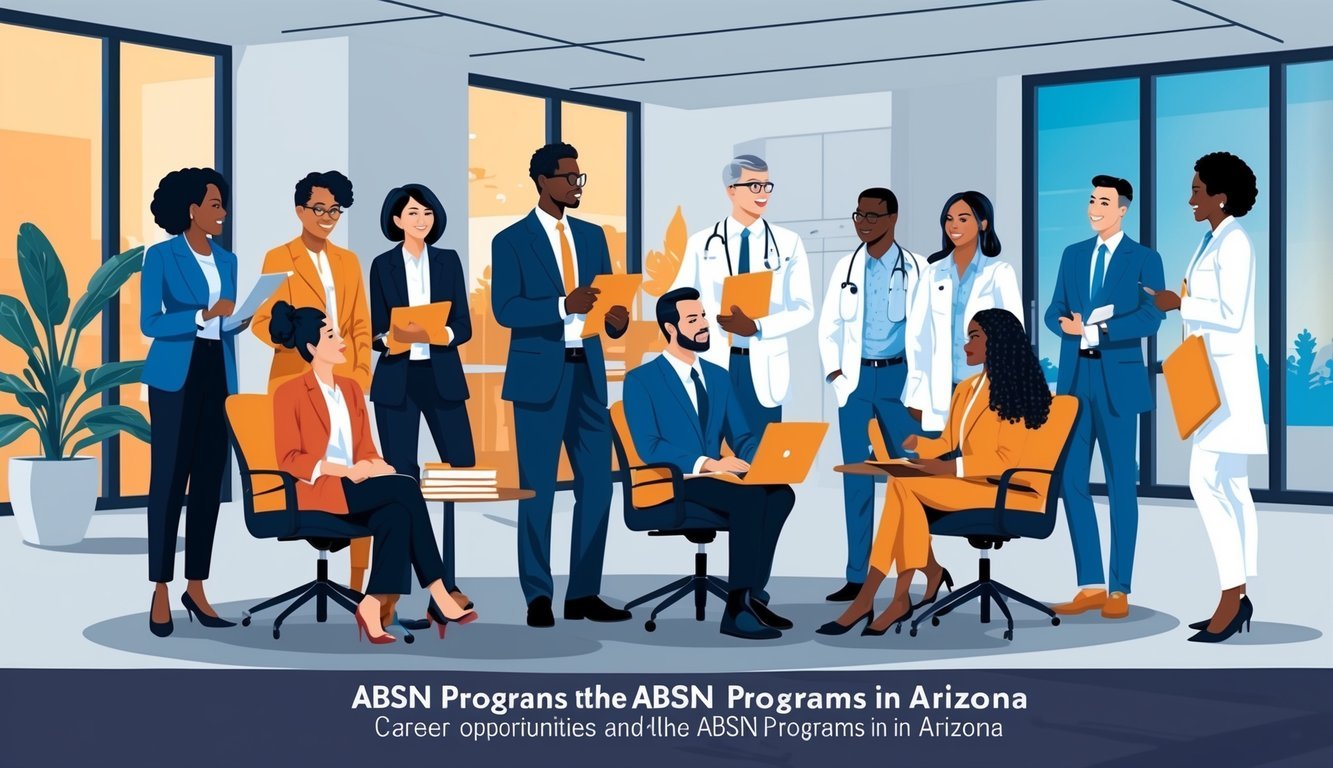Individuals looking to transition into a nursing career quickly can take advantage of Accelerated Bachelor of Science in Nursing (ABSN) programs in Arizona.
These programs are designed for those who already hold a bachelor’s degree in another field.
With an ABSN program, you can earn your nursing degree in as little as 16 months.
Pursuing an ABSN program in Arizona can significantly streamline your journey into the nursing profession.
These programs combine rigorous academic training with hands-on clinical experiences.
As you explore your options, consider the unique features of ABSN programs offered by institutions like Grand Canyon University and Arizona State University.
These programs typically blend online coursework with in-person skills labs and clinical rotations, providing a comprehensive education that prepares you for the demands of nursing.
Tuition costs for these programs range from $30,000 to $83,000, depending on various factors such as the institution and residency status.
Choosing an accredited ABSN program is crucial for ensuring quality education and meeting licensure requirements.
As you evaluate different programs in Arizona, look for opportunities that fit your career goals and learning preferences.
This will set you on a path towards a rewarding career in healthcare, equipping you to make a difference in the lives of patients.
For more detailed information, you can refer to resources like Nurse.org and GCU.
Overview of Accelerated BSN Programs in Arizona

Accelerated Bachelor of Science in Nursing (ABSN) programs in Arizona cater to individuals seeking a quick transition into the nursing profession.
These programs are designed for those who already hold a non-nursing bachelor’s degree and want to earn their nursing degree efficiently.
Significance of Accelerated Nursing Education
Accelerated nursing education holds considerable significance in addressing the growing demand for skilled nurses in Arizona.
As healthcare needs expand, the state requires a steady influx of qualified professionals.
ABSN programs allow you to complete your Bachelor of Science in Nursing in a condensed timeframe, often within 15 to 16 months.
This swift path enables you to enter the workforce faster.
Additionally, these programs are structured to build upon your existing educational foundation.
They emphasize practical skills, critical thinking, and clinical experiences vital for success in today’s healthcare environments.
Key Features of ABSN Programs
Several key features define ABSN programs in Arizona, enhancing their appeal and effectiveness:
- Program Length: Typically, programs take around 15 to 16 months to complete.
- Prerequisites: You need a non-nursing bachelor’s degree and usually a minimum 3.0 GPA to apply.
- Curriculum Structure: ABSN programs combine online coursework with hands-on clinical practice at partner healthcare facilities.
| Feature | Details |
|---|---|
| Length | Approximately 15-16 months |
| Admissions Requirements | Non-nursing bachelor’s degree; Minimum 3.0 GPA |
| Clinical Experience | Integrated clinical rotations at local hospitals |
By enrolling in an ABSN program, you benefit from structured support in areas like tutoring and mental health services, ensuring a smoother transition into nursing.
This focused approach equips you with the knowledge and skills necessary to succeed in various nursing roles.
Eligibility and Admission Requirements

Understanding the eligibility criteria and admission requirements for Accelerated BSN (ABSN) programs in Arizona is crucial for prospective students.
Ensuring you meet these criteria will streamline your application process and help you prepare for a successful nursing education.
Preprofessional Requirements
Before applying for an ABSN program, you must complete specific preprofessional requirements.
These usually include a minimum of 70 credit hours from an accredited institution, which often encompasses basic sciences, humanities, and social sciences.
Additional requirements may involve:
- Completion of prerequisite courses such as biology, chemistry, and statistics.
- A competitive GPA, commonly around 3.0 or higher.
- An acceptable score on standardized tests, where applicable.
Many programs also encourage volunteer or work experience in healthcare settings to demonstrate commitment to nursing.
Major Requirements for Admission
Once you meet the preprofessional criteria, you can focus on the major admission requirements for the ABSN programs.
These often include:
- Submission of an online application, along with official transcripts.
- Letters of recommendation from academic or professional references.
- A personal statement outlining your motivation for pursuing nursing.
For example, programs like the Accelerated BSN at ASU require these components to assess your readiness for the rigorous curriculum.
Some schools may also conduct interviews as part of their evaluation process.
Familiarizing yourself with these requirements will position you for a successful application.
Curriculum and Clinical Training

The curriculum in Accelerated BSN programs is designed to equip you with essential nursing knowledge and skills, blending theoretical coursework with practical clinical training.
You will engage in a fast-paced educational environment that emphasizes critical reasoning and effective communication within diverse healthcare settings.
Coursework Overview
In the classroom, the coursework covers fundamental areas crucial for nursing practice.
You will study subjects such as:
- Nursing Fundamentals: Learn essential nursing practices and theories.
- Pharmacology: Understand the administration and effects of medications.
- Medical-Surgical Nursing: Focus on care for patients with various medical conditions.
- Mental Health Nursing: Explore psychiatric care and effective communication strategies.
Assignments often involve group projects and hands-on activities that foster teamwork and enhance problem-solving abilities.
Online components may also be included, allowing you to learn at your own pace while still benefiting from in-person labs, which are vital for developing practical skills.
For a detailed look at Arizona ABSN programs, visit Top Accelerated BSN Programs in Arizona.
Clinical Rotations and Hands-On Experience
Clinical training is a critical component of your ABSN program.
You will participate in clinical rotations at various healthcare settings, such as hospitals, clinics, and community health organizations.
These rotations typically cover specialties including:
- Pediatrics
- Geriatrics
- Emergency Care
- Maternal and Child Health
During these experiences, you will apply your knowledge in real-world scenarios, developing skills in patient assessment, care planning, and interdisciplinary collaboration.
Emphasis is placed on effective communication and critical reasoning skills, ensuring you are prepared to address patient needs in diverse situations.
Overall, this hands-on training is invaluable for building confidence and competence as a future registered nurse.
For more insights, check Arizona ABSN Programs.
Licensing and Examination Preparation

If you are pursuing an Accelerated Bachelor of Science in Nursing (ABSN) program in Arizona, understanding licensing and examination preparation is crucial.
This section will cover important details about the NCLEX-RN exam and effective strategies for your preparation.
NCLEX-RN Exam Details
The NCLEX-RN exam is a necessary step for you to become a licensed Registered Nurse.
This computer-based exam is designed to test your knowledge, skills, and abilities essential for safe and effective nursing practice.
- Format: The exam consists of a minimum of 75 and a maximum of 145 questions.
- Subjects Covered: Key areas include safe and effective care, health promotion, and maintenance.
- Duration: You have a total of 5 hours to complete the exam.
Passing the NCLEX-RN is mandatory for obtaining your nursing license in Arizona.
You can find detailed information about registration and examination schedules on the NCSBN website.
Preparing for the NCLEX-RN
Preparation for the NCLEX-RN exam is essential to ensure you pass on your first attempt.
Consider these effective strategies to enhance your study process:
-
Study Materials: Utilize review books, online courses, and practice exams specifically designed for NCLEX-RN preparation. Many programs incorporate resources that include practice questions and simulated exams.
-
Practice Questions: Engage with NCLEX-style questions regularly. This will familiarize you with the exam format and question styles.
-
Study Groups: Form or join study groups with peers from your ABSN program. Collaborative learning can help reinforce your understanding of complex topics.
-
Scheduled Study Time: Develop a study schedule that allows for consistent review of material over time rather than cramming.
As you prepare for the exam, leveraging these strategies can significantly improve your chances of success.
Various institutions, such as the Arizona College of Nursing, offer resources and support for NCLEX-RN exam preparation.
Career Opportunities and Advancement

The healthcare sector is constantly evolving, presenting a variety of career paths for Accelerated Bachelor of Science in Nursing (ABSN) graduates.
This section highlights job prospects and the importance of continuing education in the nursing profession.
Job Prospects for ABSN Graduates
Job prospects for ABSN graduates are promising.
With a rising demand for healthcare professionals, your qualifications will be highly valued in various settings.
Common employment options include:
- Hospitals: Acute care settings require RNs across multiple specialties.
- Clinics: Outpatient care demands skilled nurses for routine patient interactions.
- Long-term Care Facilities: There is a growing need for nurses in rehabilitation and nursing homes.
The U.S. Bureau of Labor Statistics projects a 6% growth in nursing jobs from 2021 to 2031, driven by an aging population.
Graduates often receive job offers even before completion of their programs, making this a strategic time for career change into nursing.
Explore specific opportunities in Arizona through resources like Nurse.org.
Continuing Education and Specializations
Continuing education is key to advancing in your nursing career.
Engaging in specialized training enables you to differentiate yourself and meet specific patient needs.
Some popular specializations include:
- Pediatric Nursing: Focus on the care of children and adolescents.
- Emergency Nursing: Provide critical care in high-pressure situations.
- Geriatric Nursing: Address the complex needs of older adults.
Pursuing advanced certifications or degrees, such as a Master of Science in Nursing (MSN), can open doors to leadership roles and higher salaries.
Continuous professional development is vital to keeping up with the fast-paced healthcare landscape.
Organizations like the American Nurses Association offer valuable resources for ongoing education.
Financial Aid and Support Systems
Navigating the financial aspects of an Accelerated Bachelors of Science in Nursing (ABSN) program in Arizona is crucial for your success.
Understanding tuition costs and the available financial aid options can alleviate some of the financial burdens you may face as a student.
Tuition and Scholarships
Tuition for ABSN programs in Arizona can range significantly.
The Arizona College of Nursing reported costs ranging from $96,000 to $107,000 for their three-year ABSN path.
Meanwhile, Grand Canyon University estimates their ABSN tuition at approximately $53,550.
Many institutions also offer scholarships to help reduce your financial load.
For example, the Arizona Nursing Service Scholarship Award provides need-based assistance up to the cost of tuition and fees for eligible ABSN students.
| Program | Estimated Tuition | Scholarships Available |
|---|---|---|
| Arizona College of Nursing | $96,000 – $107,000 | Various scholarships including merit and need-based |
| Grand Canyon University | $53,550 | ABSN Arizona Nursing Service Scholarship Award |
Additional Financial Aid Options
In addition to scholarships, various financial aid resources are available to support your educational journey.
For example, with federal programs like FAFSA (Free Application for Federal Student Aid), you can apply for grants and student loans.
Many ABSN programs provide access to financial counseling to help you understand these options better.
Additionally, some institutions offer conditional scholarships.
Recipients of these scholarships need to commit to working in Arizona for a specified time after graduation.
Look for specific programs that include financial aid workshops or resources on their websites to aid your planning.

